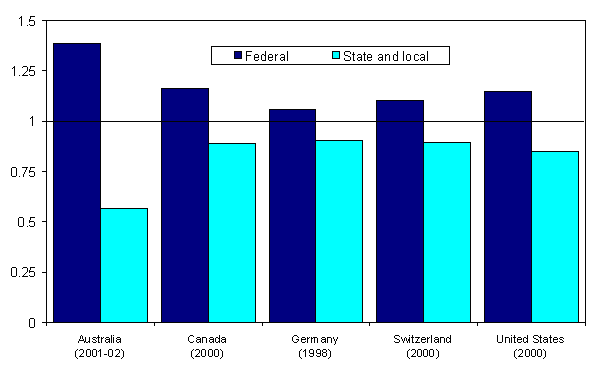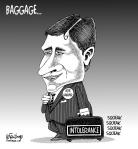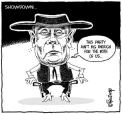Paul Martin’s messy minority democracy
Oct 10th, 2004 | By Counterweights Editors | Category: Ottawa Scene George Orwell used to say that democracy requires a certain tolerance for dirt. (He also once called Canada a country that “could be fun for a bit, especially if you like fishing.”) Paul Martin, responding to the October 7, 2004 hi-jinks over his first throne speech as a minority prime minister, has invented a variation on the theme: “Democracy’s messy … Sometimes it’s late at night; sometimes it’s different people in different rooms, and that’s the way democracy is, because you’re bringing in an awful lot of different people … I actually think this is pretty healthy.”
George Orwell used to say that democracy requires a certain tolerance for dirt. (He also once called Canada a country that “could be fun for a bit, especially if you like fishing.”) Paul Martin, responding to the October 7, 2004 hi-jinks over his first throne speech as a minority prime minister, has invented a variation on the theme: “Democracy’s messy … Sometimes it’s late at night; sometimes it’s different people in different rooms, and that’s the way democracy is, because you’re bringing in an awful lot of different people … I actually think this is pretty healthy.”
 There are of course other views. According to James Travers in the Toronto Star, by giving some last-minute strategic ground to opposition complaints about the October 5 throne speech, Martin’s new minority-government Liberals have only shown once again that they “can and will be pushed around by other parties, and, inevitably, by the provincial premiers.”
There are of course other views. According to James Travers in the Toronto Star, by giving some last-minute strategic ground to opposition complaints about the October 5 throne speech, Martin’s new minority-government Liberals have only shown once again that they “can and will be pushed around by other parties, and, inevitably, by the provincial premiers.”
No doubt wisely enough, Mr. Travers reminds us that “federal politics is a blood sport.” From this harsh angle, “Martin and his cabinet” have just shown “weakness” and “given strength and hope to parties whose priority is first defeating this government and then Liberals in the next election. The result will be risky tests of strength that will continue as long as this Parliament lasts.”
 As Travers relates as well, by “late in the day” on October 7, it was clear enough to Martin’s Liberals that “all their members would be in the House of Commons” and “a few Conservatives would find reasons not to be.” With the support of Jack Layton’s NDP, Martin would most likely have beaten a non-confidence motion from the combined forces of Harper’s Conservatives and Duceppe’s Bloc Quebecois by a few votes. (According to other press reports, Liberal House leader Tony Valeri had also been on the phone to the one ostensibly independent member of the current parliament, Chuck Cadman, from Surrey North in BC.)
As Travers relates as well, by “late in the day” on October 7, it was clear enough to Martin’s Liberals that “all their members would be in the House of Commons” and “a few Conservatives would find reasons not to be.” With the support of Jack Layton’s NDP, Martin would most likely have beaten a non-confidence motion from the combined forces of Harper’s Conservatives and Duceppe’s Bloc Quebecois by a few votes. (According to other press reports, Liberal House leader Tony Valeri had also been on the phone to the one ostensibly independent member of the current parliament, Chuck Cadman, from Surrey North in BC.)
James Travers is guessing that Paul Martin may finally come to “regret not seizing the opportunity to stare his opponents down.” And this could of course be quite right. Especially in capital cities like Ottawa, with not too much else going on, even democratic politics is a blood sport in the end. It is always wise to keep such things in mind.
 Yet Mr. Martin’s own argument, that the messy-democracy compromise he and Mr. Duceppe and Mr. Harper tacked together at the 11th hour is “actually … pretty healthy,” has some compelling enough logic. And it is at least more interesting to think about than blood sports.
Yet Mr. Martin’s own argument, that the messy-democracy compromise he and Mr. Duceppe and Mr. Harper tacked together at the 11th hour is “actually … pretty healthy,” has some compelling enough logic. And it is at least more interesting to think about than blood sports.
The particular compromise on the BQ’s “fiscal imbalance sub-amendment,” that finally pulled the pan out of the fire on the night of October 7, may similarly be less intriguing than first meets the eye. In other countries with federal systems of government, the federal level often has greater revenues relative to its responsibilities than the state or provincial level. A recent document from the State of Western Australia urges that the resulting “fiscal imbalance” is considerably greater down under than in any of the United States, Germany, Switzerland, or Canada.

Stephen Harper’s somewhat more interesting amendments are apparently still to be considered – starting the week of October 18, according to some reports. It has also been reported that these amendments “include calls for the government to consider an independent employment insurance commission to set premiums, a citizens assembly to review electoral reform, a reduction in taxes for low-income families, and a Commons vote to determine whether Canada will participate in the U.S. missile-defence program.”
The citizens assembly to review electoral reform is something that Jack Layton alluded to on TV as well, immediately after the October 5 throne speech, which had already alluded to “electoral reform” as something the government was prepared to ponder in some way.
 Harper deserves some credit for seasoning his throne-speech amendments package like this. Partly it just shows his more subtle blood-sport skills, no doubt. And some media commentators who have been around Ottawa a very long time are rightly enough quite cynical about the prospects that anyone (especially including their authors) ever intends to take the substance of these amendments all that seriously.
Harper deserves some credit for seasoning his throne-speech amendments package like this. Partly it just shows his more subtle blood-sport skills, no doubt. And some media commentators who have been around Ottawa a very long time are rightly enough quite cynical about the prospects that anyone (especially including their authors) ever intends to take the substance of these amendments all that seriously.
Yet if there actually is going to be, e.g., some variety of future official discussion about such an electoral reform as proportional representation, it is worth stressing that minority parliaments like the one we have now would almost certainly come around more often than once every 25 years, if any serious version of the reform were ever to happen in the real world.
 More generally, we clearly do have several different groups of people in different rooms in parliament today. And who can doubt that this does democratically enough reflect real and important differences in the country, from coast to coast to coast?
More generally, we clearly do have several different groups of people in different rooms in parliament today. And who can doubt that this does democratically enough reflect real and important differences in the country, from coast to coast to coast?
There are, some urge, limits to how far Mr. Harper can push any alliance with the Quebec sovereigntist Mr. Duceppe, without seminally annoying his own base of support in English-speaking Canada. These limits were shown right away by the few Conservatives who would probably not have shown up for any big test vote on October 7.
 And yet it is surely also true that if our federal politicians are going to start moving ahead on the next Canada that has to start coming soon, they are going to have to do it along with all of Mr. Duceppe’s Bloc Quebecois, Mr. Harper’s new Conservatives, Mr. Layton’s NDP, and Mr. Martin’s Liberals – with all of Atlantic Canada, Quebec, Ontario, Western Canada, Northern Canada, and all the diverse communities of many different sorts everywhere else in between. Stephen Harper deserves some credit for being ready to work with Gilles Duceppe, and vice-versa.
And yet it is surely also true that if our federal politicians are going to start moving ahead on the next Canada that has to start coming soon, they are going to have to do it along with all of Mr. Duceppe’s Bloc Quebecois, Mr. Harper’s new Conservatives, Mr. Layton’s NDP, and Mr. Martin’s Liberals – with all of Atlantic Canada, Quebec, Ontario, Western Canada, Northern Canada, and all the diverse communities of many different sorts everywhere else in between. Stephen Harper deserves some credit for being ready to work with Gilles Duceppe, and vice-versa.
Jack Layton deserves some credit in another kind of almost high-minded way. Someone needed to stand beside the government in this initial test of how to make the new minority parliament succeed, in a new 21st century that has already given various kinds of notice that it too is going to be different from what all the global village has known in the past. Whatever else, Layton has now got both Paul Martin’s government and Stephen Harper’s official opposition talking about the kind of electoral reform that at least Jack Layton says the NDP wants us to look into more deeply. And who would deny outright that this might somehow do some kind of good?
 In the very end, Paul Martin deserves credit too, for not finally deciding to bull it all out and push everything to a no-confidence motion on the night of October 7 that, it now seems, he likely enough would have won (“by a few votes” as James Travers has suggested). It might have been better for the narrow short-term interests of the Liberal Party of Canada if the prime minister had done this. He may come to wish he had himself.
In the very end, Paul Martin deserves credit too, for not finally deciding to bull it all out and push everything to a no-confidence motion on the night of October 7 that, it now seems, he likely enough would have won (“by a few votes” as James Travers has suggested). It might have been better for the narrow short-term interests of the Liberal Party of Canada if the prime minister had done this. He may come to wish he had himself.
But if he had just stared down the opposition, we would now have something less interesting to look at and think about, whenever we happen to turn our thoughts towards what’s going on in Ottawa these days. It sometimes seems that our current Canadian political culture believes almost anything interesting about politics is too dangerous for stability in our fragile young country, and hence to be avoided at all costs.
 If pursuing the assorted interesting opposition amendments to the throne speech does result in “risky tests of strength that will continue as long as this Parliament lasts,” it is arguable enough that the accompanying excitement will be good for Canadian democracy too. No citizen’s life is actually put at risk by the prospect of going to the polls again as early as sometime late next spring (just after the new Conservatives have held their first policy convention, say).
If pursuing the assorted interesting opposition amendments to the throne speech does result in “risky tests of strength that will continue as long as this Parliament lasts,” it is arguable enough that the accompanying excitement will be good for Canadian democracy too. No citizen’s life is actually put at risk by the prospect of going to the polls again as early as sometime late next spring (just after the new Conservatives have held their first policy convention, say).
And if we the people of Canada are in the same frame of mind then as we were this past June 28, we can always just vote all of our politicians back into office in exactly the same proportions. And then they will really have to all get along and get on with governing and building the country for our children’s and grandchildren’s future, just like we want them to do now. In this limiting case, at least, voters can play the blood sport too.

